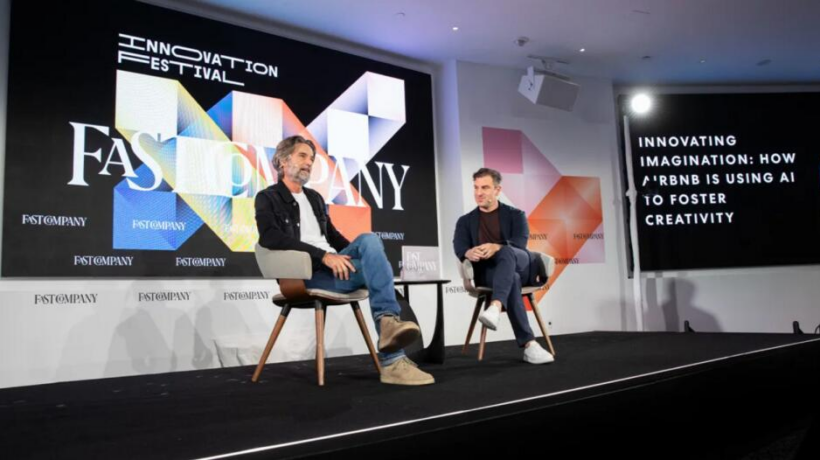“The only scenario in which the AI revolution ends well is if everyone participates, bringing a diversity of opinions,” says Brian Chesky, cofounder and CEO of Airbnb, speaking at the Fast Company Innovation Festival in New York last month. “It’s normal to fear the unknown, and that fear can make you feel excluded, leading you to perceive it as a threat. However, If only a few people control the future, it’s not going to end well.”
Chesky’s call to arms is clear: Creative people need to jump into the AI conversation—as the integrity of AI is ultimately determined by its inputs.
Kicking off a new season of the Leaders in Innovation podcast, Brian Chesky argues that artificial intelligence is “like getting in the car, hitting the gas pedal, and you’re gonna go 1,000 miles an hour and you can never go in reverse.” It’s not just a technological issue, he says, but an ethical and social one. We need to understand the unintentional consequences of our innovation and design around them.
The key, Chesky says, is to focus on good use cases that foster positive human interactions.
PRODUCTS NEED TO HAVE A SOUL
“We have to design principles,” Chesky says. “Such as, what makes people happy? What is good for people? Those principles have to be imbued in the design of your product. That’s a humanities question, not a technological one.”
In other words, products need to have a soul. These principles should be rooted in what is beneficial for humanity and should be communicated transparently. It’s not just about creating a product; it’s about creating a product that aligns with our collective values and aspirations.
“One of the great things about Apple—as Steve Jobs often talked about—is that it stands at the intersection of technology and the humanities,” Chesky says.
Brands like Apple and Airbnb can become safe harbors in this fast-paced world, signaling a more positive relationship between AI and good human relations. They show us that technology and humanity can coexist, and even thrive, when guided by thoughtful design and creative leadership.
To illustrate this point, Chesky references social media, recounting a conversation he had with a leading researcher on loneliness. When he asked whether social media contributes to or alleviates loneliness, the researcher explained that the impact of social media on loneliness depends on how it’s used.
If people use social media as a destination, a place where they solely interact and observe others’ lives, it tends to increase feelings of loneliness. However, if social media serves as a gateway, a means to connect with people offline, it can actually fulfill its promise of connecting us with people around the world.
Chesky extended this idea to AI, suggesting that it has the same potential: to either isolate us in echo chambers or connect us in unprecedented ways.
As we stand on the cusp of an AI-driven future, the stakes have never been higher. Chesky’s insights remind us that the path we choose now will shape our society for generations to come. It’s not merely a question of technology; it’s a matter of ethics, social impact, and, fundamentally, human-centric design.
As he says: “Creatives need to join the technologists.”
Listen to the full conversation between Brian Chesky and James Vincent on this week’s Leaders in Innovation podcast. Subscribe on Apple Podcasts, Stitcher, Spotify, or wherever you get your podcasts.







